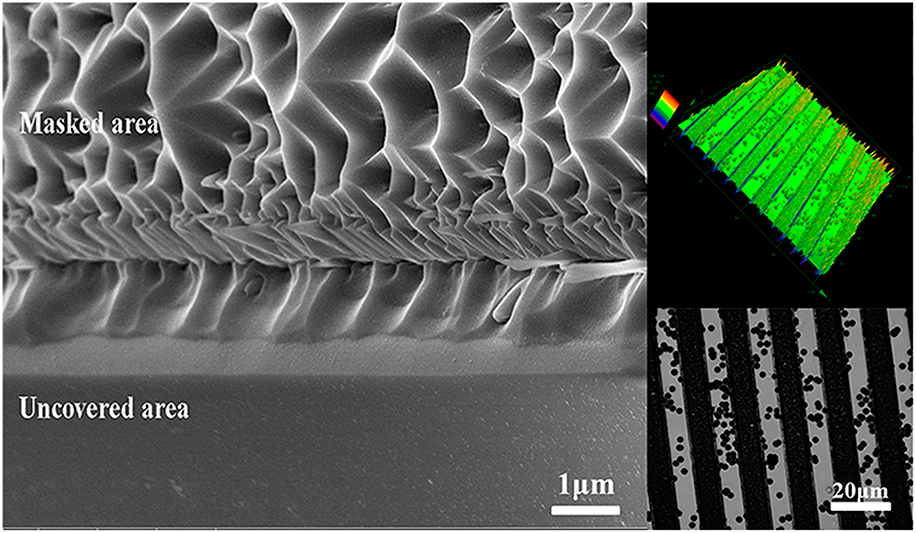Crossref Citations
This article has been cited by the following publications. This list is generated based on data provided by
Crossref.
Cumont, Aude
Pitt, Andrew R.
Lambert, Peter A.
Oggioni, Marco R.
and
Ye, Haitao
2021.
Properties, mechanism and applications of diamond as an antibacterial material.
Functional Diamond,
Vol. 1,
Issue. 1,
p.
1.
Zheng, Yuting
Liu, Yanhui
Wang, Lin
Liu, Jinlong
Wei, Junjun
Chen, Liangxian
An, Kang
Zhang, Xiaotong
Ye, Haitao
Zhou, Haojun
Tao, Hongliang
Yin, Yuhang
Ouyang, Xiaoping
and
Li, Chengming
2022.
Vertically Aligned Boron-Doped Diamond Hollow Nanoneedle Arrays for Enhanced Field Emission.
ACS Applied Nano Materials,
Vol. 5,
Issue. 8,
p.
10878.
Edalati, Khatereh
Higham, Simon
De Leon, Sorel E.
Au, Shun Long Cyril
Nadarajah, Athavan
Prawer, Steven
and
Garrett, David J.
2023.
Effective removal of metal-carbide contamination from diamond circuit boards by reactive ion etching.
Diamond and Related Materials,
Vol. 139,
Issue. ,
p.
110329.
Zhang, Haochen
Yan, Zengyu
Zhang, Hanxu
Song, Zhipeng
and
Chen, Guangchao
2024.
Polycrystalline CVD diamond wafer polished by molten iron erosion.
Diamond and Related Materials,
Vol. 142,
Issue. ,
p.
110734.
Gray, Tia
Zhang, Xiang
Biswas, Abhijit
Terlier, Tanguy
Oliveira, Eliezer F.
Puthirath, Anand B.
Li, Chenxi
Pieshkov, Tymofii S.
Garratt, Elias J.
Neupane, Mahesh R.
Pate, Bradford B.
Birdwell, A. Glen
Ivanov, Tony G.
Vajtai, Robert
and
Ajayan, Pulickel M.
2024.
Benchmarking diamond surface preparation and fluorination via inductively coupled plasma-reactive ion etching.
Carbon,
Vol. 228,
Issue. ,
p.
119366.
Suman, Shradha
Sharma, Dhananjay Kumar
Szabo, Ondrej
Rakesh, Benadict
Marton, Marian
Vojs, Marian
Vincze, Andrej
Dutta, Soumya Prakash
Balaji, Umapathi
Debasish, Debidutta
Sakthivel, Ramasamy
Sankaran, Kamatchi Jothiramalingam
and
Kromka, Alexander
2024.
Vertically aligned boron-doped diamond nanostructures as highly efficient electrodes for electrochemical supercapacitors.
Journal of Materials Chemistry A,
Vol. 12,
Issue. 32,
p.
21134.
Nasir, Farheen
Pan, Aixi
and
Cui, Bo
2025.
Fabrication of high aspect ratio diamond tip using reactive ion etching.
Diamond and Related Materials,
Vol. 152,
Issue. ,
p.
111950.
Suman, Shradha
Sharma, Dhananjay Kumar
Szabo, Ondrej
Rakesh, Benadict
Marton, Marian
Vojs, Marian
Sankaran, Kamatchi Jothiramalingam
and
Kromka, Alexander
2025.
Nanostructured Boron‐Doped Ultra‐Nanocrystalline Diamond Micro‐Pyramids: Efficient Electrochemical Supercapacitors.
Small,
Vol. 21,
Issue. 3,
Yu, Jiarong
Liu, Xinyue
Xu, Rongbin
and
Yu, Daquan
2025.
Single crystal diamond polishing assisted by inductively coupled plasma etching.
Diamond and Related Materials,
Vol. 152,
Issue. ,
p.
111978.
